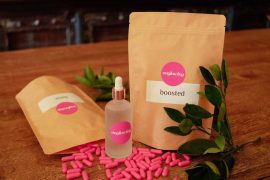By Gina Urlich, BHSc Nutritional Medicine
Introducing solids is a beautiful milestone. It marks a transition from the exclusive milk-feeding days into a world of texture, taste, and discovery. As exciting as this stage is, it’s also a critical window of opportunity to nourish your baby with foods that not only meet their energy needs but also lay the foundations for long-term health. Two of the most important nutritional priorities at this time are supporting iron stores and building a robust gut microbiome.
In this article, we’ll explore how you can support your baby’s iron and gut health with nutrient-dense whole foods – no fortified cereals or synthetic supplements needed. Instead, we’ll look at traditional, real food options like liver, bone broth, and probiotic-rich foods that have nourished generations of babies with remarkable results.
Why Iron Matters So Much at 6 Months
Babies are born with a finite store of iron, built up during pregnancy, particularly in the third trimester. Around six months of age, these stores begin to decline, especially in breastfed babies. While breast milk remains an incredibly valuable source of bioavailable nutrients and protective compounds, its iron content is low. This makes complementary feeding with iron-rich foods essential.
Iron is vital for brain development, energy production, immunity, and the transport of oxygen around the body. In infancy, iron deficiency – even mild – can affect cognition, behaviour, and motor development.
But not all iron is created equal. Heme iron (from animal foods) is far more absorbable than non-heme iron (from plant sources). Both heme and non-heme are more bioavailable than fortified synthetic iron.

Liver: The Gold Standard First Food
While liver may not be the most trendy superfood on your Instagram feed, it truly is one of nature’s most potent baby foods. Just a tiny amount delivers a dense package of iron, vitamin A, B12, choline, and folate – all critical nutrients for a rapidly developing brain and body.
Why liver is ideal for first foods:
- Iron powerhouse: A small portion of beef or chicken liver provides a baby’s full daily requirement of iron in the most absorbable form.
- Supports detoxification and immunity: Thanks to its high content of zinc, B vitamins and vitamin A.
How to serve it:
You can gently cook and purée liver with bone broth, or mix into mashed root vegetables or slow-cooked meat. For babies doing baby-led weaning (BLW), liver can be sliced into soft strips or blended and spread on toast fingers. For an easy, ready-to-go option, Odi baby cereal and purees also contain the perfect amount of liver to support iron intake.
Bone Broth: A Healing Elixir for Gut and Immune Health
Bone broth is a beautiful foundational food that supports the gut lining and introduces valuable minerals like calcium, magnesium, and phosphorus in highly bioavailable forms.
Benefits of bone broth:
- Gut integrity: The gelatin and amino acids like glycine and proline help nourish the gut lining and support digestion.
- Improves nutrient absorption: Broth may enhance the absorption of minerals and aid in the digestion of meats and vegetables introduced alongside it.
- Hydrating and gentle: For babies starting solids, it can be a soothing base to purées or a drink offered in small amounts by spoon or cup.
How to serve it:
Use it to thin mashed vegetables or as a base for soups and slow-cooked dishes. It pairs well with root veggies like pumpkin, carrot, and sweet potato. You can also braise meats in bone broth to make them extra tender and digestible. If you don’t have time to simmer your own bones, Odi has a 100% bone broth with no added salts or preservatives.

Meat: The Unsung Hero of First Foods
Meat often gets overshadowed by puréed fruits and rice cereals, but it’s arguably one of the best foods to introduce early, especially red meat like lamb and beef.
Why meat matters:
- Iron and zinc rich: Red meat is one of the best sources of heme iron and zinc, both crucial for immune function, brain development, and cellular growth.
- Balanced amino acids: These support growth, neurotransmitter production, and repair.
- Easy to digest when properly prepared: Slow-cooked, tender meats are ideal for babies and blend well into purées or finger-sized strips.
How to serve it:
Slow-cook lamb shoulder, beef chuck, or chicken thighs until very soft, then shred or mash with vegetables and broth. Offer strips for BLW babies or roll them into small meatballs with herbs and grated veggies.
Tip: Combine meat with a vitamin C source (like mashed kumara, zucchini, or berries) to enhance iron absorption.
Eggs: Nature’s Multivitamin
Eggs are a gentle introduction to animal protein and offer a wide array of nutrients that support gut lining, cognitive development, and immunity.
Nutrients in eggs include:
- Iron and B12 (especially in the yolk)
- Choline for brain development
- Selenium and vitamin D
- High-quality protein
How to serve them:
Start with well-cooked egg yolk, mashed with breast milk, broth, or avocado. Once tolerated, you can offer scrambled eggs or soft-boiled egg quarters.
Tip: Egg whites are a common allergen, so introduce them early but mindfully, ideally between 6-8 months of age.











